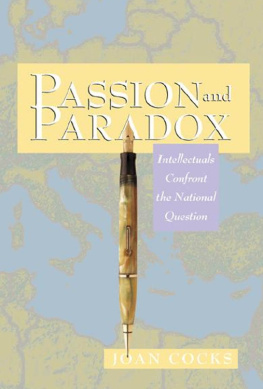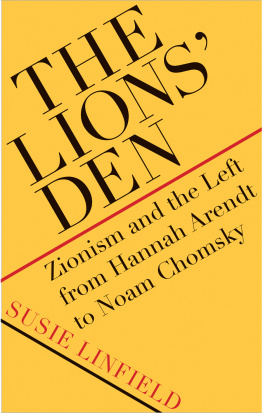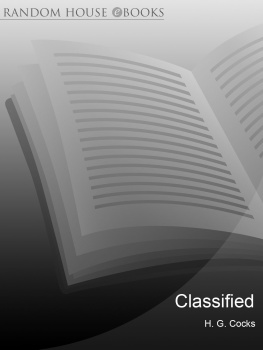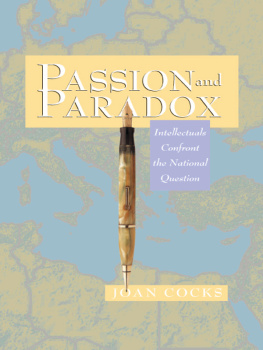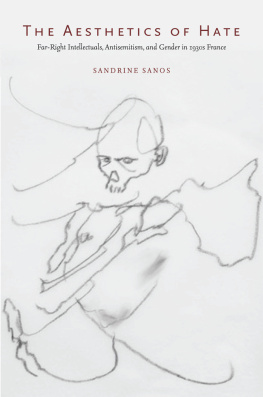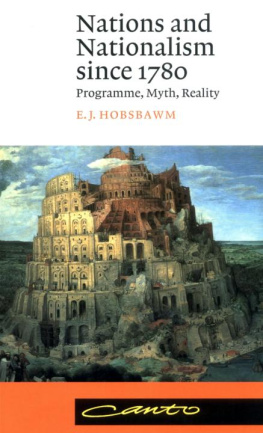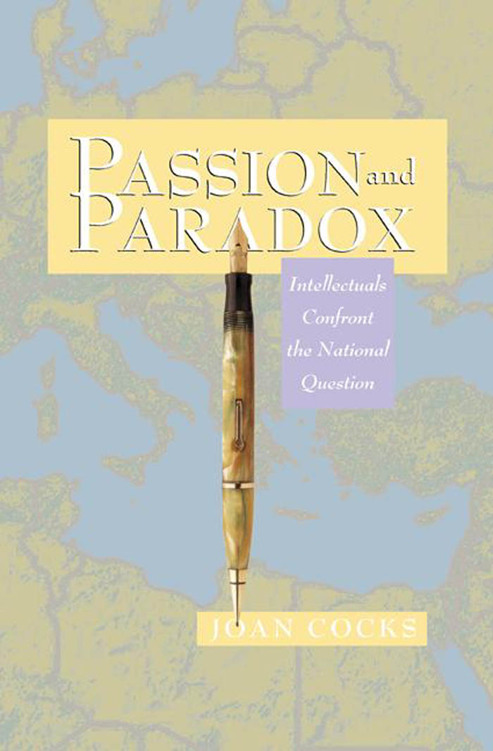joan cocks
princeton university press princeton and oxford
Copyright 2002 by Princeton University Press
Published by Princeton University Press, 41 William Street , Princeton, New Jersey 0854 In the United Kingdom: Princeton University Press, 3 Market Place , Woodstock, Oxfordshire OX20 1S Y
All Rights Reserved
Library of Congress Cataloging-in-Publication Data
Cocks, Joan, 1947 Passion and paradox : intellectuals confront th e national question / Joan Cocks .
p. cm. Includes bibliographical references and index.
ISBN 0-691-07467-4 (cloth : alk. paper) ISBN 0-691-07468-2 (pbk. : alk. paper)
NationalismPhilosophy . I. Title. JC311 .C6135 2002
320.54 01dc21 2001038755
British Library Cataloging-in-Publication Data is available
This book has been composed in Sabon and Bernhard
Printed on acid-free paper.
www.pup.princeton.edu
Printed in the United States of America
12345678910
12345678910 (Pbk.)
for pete r
| mark mazower | The First World War and the collapse of Europes |
| Dark Continent: | old continental empires signalled the triumph not |
| Europes Twentieth | only of democracy but alsoand far more en- |
| Century | duringlyof nationalism. With the extension of |
| the principle of national self-determination from |
western to central and eastern Europe, the Paris peace treaties cre ated a pattern of borders and territories which has lasted more or less up to the present. Yet the triumph of nationalism brought bloodshed, war and civil war in its train, since the spread of the nation-state to the ethnic patchwork of eastern Europe also meant the rise of the minority as a contemporary political problem. Where a state derived its sovereignty from the people, and the people were defined as a specific nation, the presence of other ethnic groups inside its borders could not but seem a reproach, threat or challenge to those who believed in the principle of na tional self-determination.
zygmunt bauman Universality is the war-cry of the underprivileged
Exit Visas and Entry ... [and] Jews were underprivileged... univer-
Tickets: Paradoxes of sally ... The Jews, in [Isaac] Deutschers poi-
Jewish Assimilation gnant words, dwelt on the borderlines of var
ious civilizations, religions and national cultures... they lived on the margins... of their respective nations. As for the great Jewish prophets of universality, like Spinoza, Heine, Marx, or Rosa Luxemburg, each of them was in society and yet not in it. It was this that enabled them to rise in thought above their societies, above their nations, above their times and genera tions, and to strike out mentally into wide new horizons and far into the future. The idea of redemption through universality was... at home in Jewish history.... [But it] was the most perverse paradox of emancipation that, under the banner of universality, it promoted a new particularization. In practice, it meant the renun ciation of a specific Jewish particularity... at the price of embrac ing a new one, be it of a religious, national, or cultural kind.
aijaz ahma d Partitions make it seem as if liberation comes in the form of a series of surgical invasions.
Content s
Acknowledgments ix
Introduction 1
chapter one
Karl Marx Uncovers the Truth of National Identity 18
chapter two
Imperialism, Self-Determination, and Violence : Rosa Luxemburg, Hannah Arendt, and Frantz Fanon 4
chapter three
On the Jewish Question : Isaiah Berlin and Hannah Arendt 7
chapter four
Are Liberalism and Nationalism Compatible? A Second Look at Isaiah Berlin 92
chapter five
In Defense of Ethnicity, Locality, Nationality: The Curious Case of Tom Nairn 111
chapter six
Cosmopolitanism in a New Key:
V. S. Naipaul and Edward Said 133
Conclusion 158
Notes
Bibliography
Index
This page intentionally left blank
Acknowledgment s
When I was a child, my father told me to extend to strangers the same fair treatment I wanted for myself. My mother told me, Take care of your own first, because no one else will. This book can be read as reflections at the friction point of these two principles, be tween which the whole world seems to sway. Even though be leaguered minorities have a special reason to believe that partic ularistic solidarity is for realists and universal justice is for dreamers, my own inclinations tilt strongly toward the dream. One result of that tilt is that many members of my own minority may be disturbed by critical comments on Jewish nationalism made between the cov ers of this book. I hope they will come to realize that my criticisms apply to all ethnonationalisms equally. That is, they concern not Jews or Judaism per se but the deformations that occur whenever any ethnic or religious or racial identity becomes the basis of a politi cal community. Such deformations are inevitable even when histori cal events close off to an oppressed people all political paths except the ethnonational path.
Passion and Paradox owes a special debt to Bonnie Honig, who has been writing in her own, unique vein on foreignness and national identity. If my sympathies lie with a new cosmopolitanism, my habits of life are rooted in one place, and Bonnie has been indefatig able in trying to push me out of my western Massachusetts shell. She bears some responsibility for this book, although not of course for its point of view, both because she was an unstinting reader of so many of its pages and because it was she who first insisted that I undertake it as a project.
The books greatest debt is to Peter Cocks, who has kept up a running argument with me on the national question for more than a decade, turning every dinner conversation into a seminar and sometimes into a battle of clashing political positions. Out of the combustible material of our debates have come many of the lines of inquiry I pursue here. My favorite memory is of us each lying on our own bale of straw one sunny afternoon at Peters brothers farm in Devon, looking out over the English countrysideso much still something out of Constableand swapping views for hours on Tom Nairn. An irrepressible bibliophile and library lover, Peter was always on the lookout for material on nationalism while pursuing his own different research interests. He discovered many of the reviews and articles on which I draw here and at least one obscure book. I could not have had a more vociferous, stimulating, or generous intellectual companion.
Other people also deserve more than a word of thanks. Paul James and an anonymous second reader for Princeton University Press sub mitted well-considered and well-crafted comments on my manu script. Ian Malcolm, my editor at Princeton, was warmly encourag ing about the manuscripts destiny and, in his own suggestions for revision, applied just the right light but astute editors touch. Jenn Backer was a sensitive copy-editor with a spartan approach to the comma. My dedicated friends Amrita Basu in political science at Amherst College, and Debbora Battaglia in anthropology and Karen Remmler in German studies at Mount Holyoke College, paid close attention to earlier versions of several of these chapters, which eased my task of improving them. Conversations at two faculty seminars were especially pivotal for me. The first was a Pew Foundation funded Faculty Seminar on Ethnicity and Nationalism organized by Stephen Jones at Mount Holyoke College; the second, a Ford Foun dationfunded Five College Faculty Symposium at Hampshire Col lege titled Rethinking Secularism and Human Rights, organized by Amrita Basu and Ali Mirsepassi. At that symposium, I was fortunate to have Pavel Machala as the commentator for my paper on nation alism and cosmopolitanism. His brilliant thoughts on the significance of exile deserve an essay of their own. It was at the same conference that the charismatic human rights activist, lawyer, and intellectual Abdullahi Ahmed An-Naim made his unforgettable appearance. The words of this humane man convinced me that a new universal ism is not simply an academics fantasy but is already practiced in local settings all over the world.

